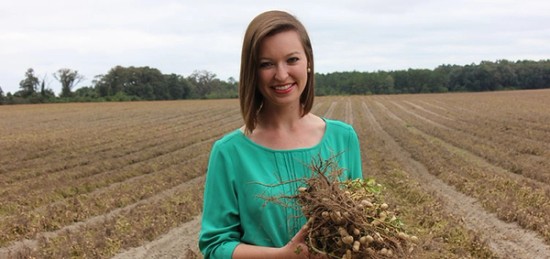Casey Cox Kerr doesn’t just think of sustainability when it’s convenient; she’s made conservation her personal and professional passion. She is the sixth generation of her family to farm along the Flint River. Casey utilized her degree in Natural Resource Conservation from the University of Florida as a foundation to lead her back to southwest Georgia – with a renewed passion and purpose to be involved in agriculture and conservation. As a millennial farmer – with an interest and training in sustainability – we asked her about her family, her passion for sustainability and what it’s like to be a millennial farmer.
Casey, tell us about your family and your farm.
We farm 1,000 acres with a rotation of peanuts, sweet corn, soybeans, field corn, and we also own 1,400 acres of timber land. Part of this land has been in our family for over 150 years.
What’s it like being a female millennial farmer? Are there challenges?
Growing up in the information age, my generation’s culture revolves around technology and communication. The effects of this cultural shift are evident in agriculture – it is an exciting time to embrace innovation on the farm, implementing the use of sensors, drones, or GPS technology.
As a millennial, I understand the power of communication and marketing, especially in the era of social media. With 99% of the American population engaged in professions outside of farming, we have the capacity to share our stories, our lifestyles, through the power of the Internet in a way that is truly incredible to comprehend.
Most farm families know that women have always played a vital role in the success of a farm, but with my generation, there is no hesitation for women to be at the forefront. Very few people in my generation are returning to the farm, so my community has embraced me – pleased to see a young person return to a rural area to carry on the family business. The agricultural community has already given me so many opportunities to be a leader in the two and a half short years that I have been home.
When did a passion for farming and sustainability really take hold with you?
My affinity for the outdoors began as a child – I love to explore. The Flint River borders the majority of our farm, and I grew to love this river as an extension of our home. At the time, the economic and ecological significance of the river was still unknown to me, but I knew it was a special place to be treasured and protected.
Right before I left for college, there was a major drought that inflamed the conflicts concerning the river. A short time later, when choosing my college major, I discovered Natural Resource Conservation and knew it was the perfect fit.
Throughout college, I had the opportunity to intern with the Flint River Partnership. It was tremendously exciting to see that some of the most innovative, conservation-driven technologies in the country (and in some cases, the world) were being developed right here in southwest Georgia.
I have the opportunity to advocate for the industry I love and share my perspective with the 99 percent of the population who do not farm for a living. Even though I grew up on a farm, I never knew that producers in southwest Georgia contributed so significantly to the country’s food, fiber, and fuel supply.
I want to continue being a steward of the land and natural resources so that many generations beyond mine will have that opportunity.
For more about the Flint River Soil and Water Conservation District that helps farmers conserve soil and water resources in the Flint River Basin of Georgia, visit flintriverswcd.org.
